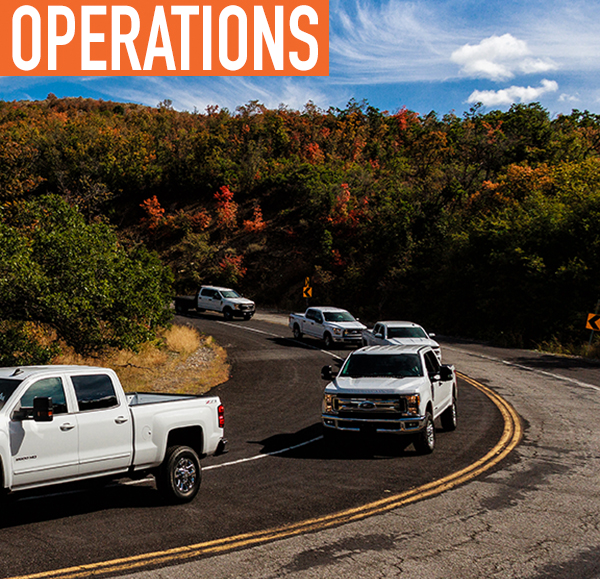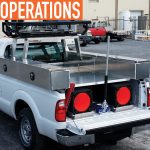As a fleet manager, you’ve likely wrestled with the decision to lease or buy your fleet. There are definitely pros and cons to each. But what about renting? Have you ever considered renting some or all of your fleet? It’s a viable option to add to the mix.
Some organizations swear by purchasing their fleet, while others are loyal to leasing. And, some organizations find more benefit in renting. So what is the best option for you and your company? It actually depends on many factors. Before we assess them, let’s define what each really means.
Rent—Renting typically refers to paying for the use of a vehicle for a day, up to several months at a time (sometimes as long as 12 months).
Lease—Leasing is similar to renting but consists of longer time periods—typically more than 12 months. You are paying for the “use” of the vehicle here too.
Buy—Buying or purchasing a vehicle means using your capital upfront for the outright ownership of the vehicle.
RENT—PROS & CONS
If you are a fleet or equipment manager, you may have never considered renting your fleet. But here are some reasons why renting might be the perfect fit for your organization:
Pros
- No Long-Term Commitment: Choose to use the vehicles from days to weeks to months (not years).
- Flexible with Vehicle Pick Up and Delivery Location (consider vehicle transport): Most fleet rental companies deliver and pick up your vehicles wherever you need them, e.g. the project site.
- Allows Closer to 100% Fleet Use: Instead of purchasing all of your vehicles and having them sit on your lot during off peak times, renting allows you to fill in those fleet gaps.
- Newer Vehicles: When renting, you get a new or close-to-new vehicle. Your crew has access to the latest vehicle technology and safety features, and there is rarely a need to worry about these vehicles breaking down. Plus, the fuel economy on new vehicles is better.
- Preserve Capital: If your company is in need of immediate cash flow, renting makes more sense. It can apply the capital to other areas. There is no upfront capital required; your CFO will appreciate this.
- Off-Balance Sheet Treatment: Buying fleet vehicles is a major capital expense directly impacting your debt-to-equity ratio. Renting is not as large an expense and is usually treated off the balance sheet, which is another attractive item to your CFO.
- Less Administration: Since your company does not own the vehicles, you do not need to worry about tasks like tag and license renewal and payment of property taxes.
- No Vehicle Acquisition and Disposal: To acquire and dispose of vehicles can be time-consuming and require some expertise. Rental companies are better equipped to sell these vehicles when ready.
Cons
- Some Limitations: Many rentals have mileage and wear and tear limitations.
- No Tax Depreciation Benefit: The owner of the vehicle can take advantage of this benefit—so the benefit will go to the rental company, not your business.
- No Resale Option: Similarly, the resale option is that of the owner of the vehicle—the rental company.
LEASE—PROS & CONS
With leasing, there are many similarities to renting. Let’s find out where the similarities lie.
Pros
- New Vehicles: Similar to renting, you will have access to the latest in technology and safety features.
- Maintenance Programs: With full-service leasing, you might have access to preventive maintenance, repairs, support, and breakdown service.
- Less Administration: Like renting, there is no need for tag and license renewal because your company does not own the vehicle. Leave that up to the lessor.
- No Vehicle Acquisition and Disposal: No need to be an expert in this; it is not necessary when leasing.
- Option to Purchase: In some cases, at the end of your lease, you may have the option to purchase the vehicle.
Cons
- On Balance Sheet Reporting: In December 2018, all operating lease expenses are required on the balance sheet (for public business entities; for all others, the date is December 2019).
- Some Limitations: With most leases, there are mileage and wear and tear limits.
- No Tax Depreciation Benefit: The owner of the vehicle can take advantage of this benefit—so the benefit will go to the leasing company, not your business (just like renting).
BUY—PROS & CONS
Renting and leasing may seem like better options, but there are definitely benefits to purchasing your fleet.
Pros
- No Limitations: Your vehicles are not subject to mileage and wear and tear limitations. If you drive cross country often, buying makes more sense for you.
- No Time Restrictions: With leasing (and sometimes with renting), you are required to keep the vehicle a specified length of time. When you own it, you can offload it whenever you’d like with no penalties.
- Leverage with Pricing: If your company purchases vehicles from a specific dealer, you may have leverage to negotiate lower pricing for future purchases.
- Tax Benefits: Separate from renting and leasing, your company (the owner) benefits from the depreciation of the vehicles.
Cons
- Upfront Capital: Opposite of renting, you tie up a large chunk of capital when purchasing.
- Maintenance: Guess who’s responsible for this? You.
- Administration: Your company is responsible for this, too. Someone needs to ensure the tag and license renewals are taken care of, as well as pay the annual taxes.
- Acquisition and Disposal: You are on the hook here too. You can always hire a third party to help with this, but that also costs money.
- Older Vehicles: Most organizations that purchase vehicles do not turnover their fleet often. Thus, a majority of the time, your fleet will consist of older and sometimes outdated vehicles leading to more maintenance issues and possibly unsafe driving conditions.
After reviewing all of the pros and cons for each type of fleet acquisition, which works the best for you and your organization? Hopefully this article helped you come closer to a decision in doing what’s best for your fleet.
ABOUT THE AUTHOR
With more than 16 years in marketing, including digital and traditional, Jan Eliason is currently the director of marketing at Flex Fleet Rental and thrives on driving high quality leads and creating an unforgettable brand. Find out more, visit www.flexfleetrental.com.
MODERN WORKTRUCK SOLUTIONS: JUNE 2018 ISSUE
Did you enjoy this article?
Subscribe to the FREE Digital Edition of Modern WorkTruck Solutions magazine.
![]()





